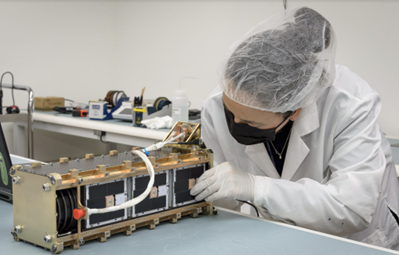
- defense
- smart cities
- agriculture
- infrastructure
- climate science
- search & rescue
Unfortunately, nanosatellites today operate like monolithic satellites of the past: they are manually operated at high costs, and impede the realization of the potential of nanosatellites for these important cyber-physical systems applications. This project envisions a new operating model for space-based cyber-physical systems in nanosatellite constellations called a “software-defined nanosatellite constellation,” which unleashes their potential.
A software-defined constellation is a collection of nanosatellites capable of autonomously sensing the environment, processing data, and cooperatively planning and taking mechanical actions. This initiative realizes this vision through cross-cutting cyber-physical systems research spanning computer systems, control, planning, actuation, machine learning, and communications. It will culminate in the launch of a software-defined constellation testbed that implements several space-based applications, demonstrating these societally important capabilities and applications, and functioning as a valuable resource for other cyber-physical systems researchers.
Our work demonstrates the project’s value with on-orbit infrastructure and testbeds that form an open platform for future space-based cyber-physical systems research. It will have a broad, transformative impact on society, industry, and education, within and beyond the cyber-physical and space systems communities. Software-defined nanosatellite constellations create an industry of cost-effective space-based applications. The work eliminates barriers to space, enabling industry to develop space-based applications.
Contact us
Reach out to Brandon Lucia to learn more about this initiative.
Outreach

Source: Carnegie Mellon University
A woman works in a clean-room to prepare a 3U CubeSat nanosatellite.
The initiative creates a new field of research around space-based cyber-physical systems fostering research and education. This project includes ambitious education activities from middle school to post-graduate levels.
Our team will mentor middle and high school students from urban public schools through space systems research internships, and will involve undergraduates and graduate students in research mentoring and new curricula. The proposed outreach activities will engage society broadly via artist-in-residence programs, research community-building, and public/academic/private partnerships.